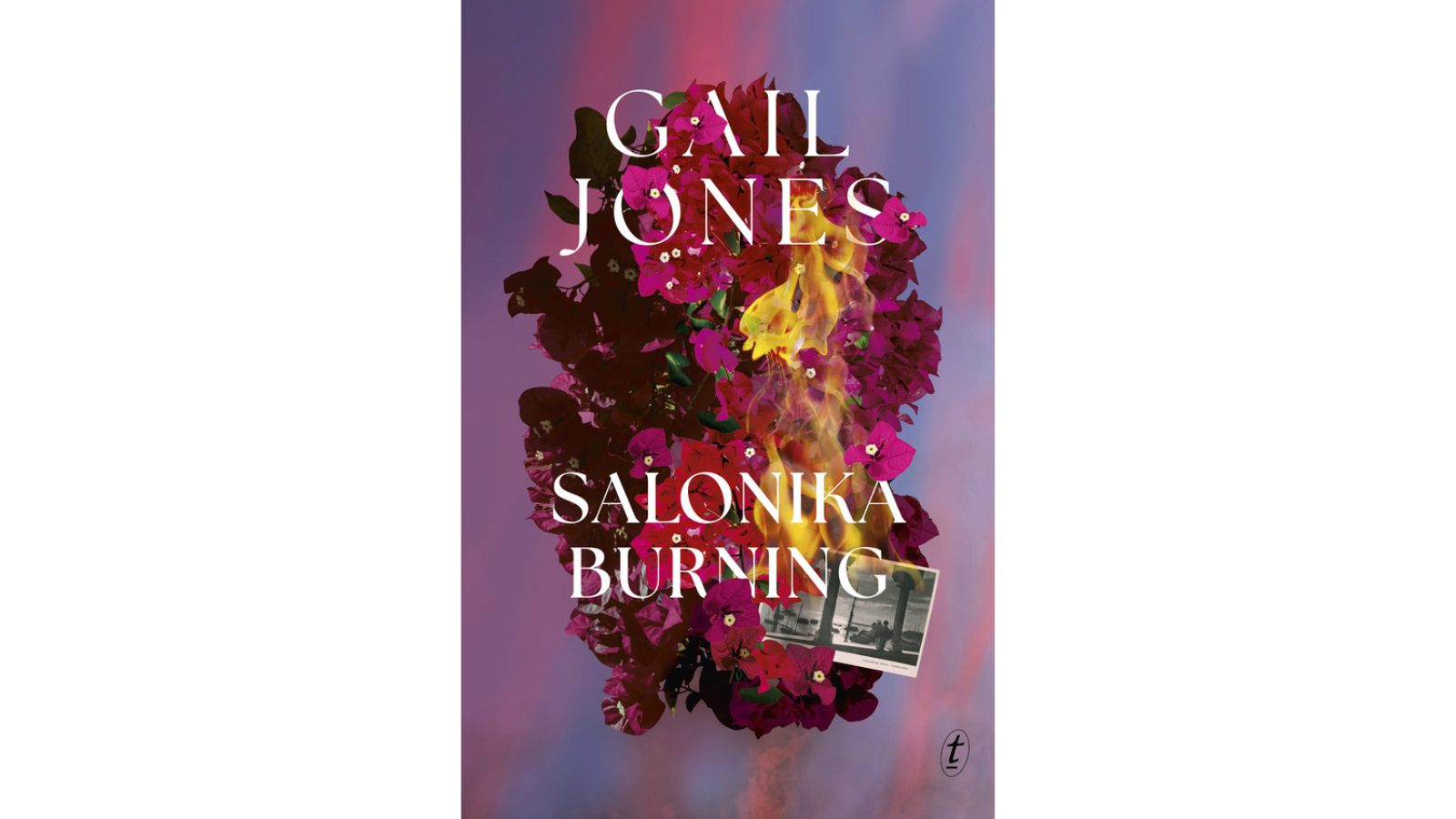Fiction Award Shortlist

Title: Salonika Burning
Author: Gail Jones
Publisher: Text Publishing
Greece, 1917. The great city of Salonika is engulfed by fire as all of Europe is ravaged by war.
Amid the destruction, there are those who have come to the frontlines to heal: surgeons, ambulance drivers, nurses, orderlies and other volunteers. Four of them—Stella, Olive, Grace and Stanley—are at the centre of Gail Jones’s extraordinary new novel, which takes its inspiration from the wartime experiences of Australians Miles Franklin and Olive King, and British painters Grace Pailthorpe and Stanley Spencer. In Jones’s imagination these four lives intertwine and change, each compelled by the desire to create something meaningful in the ruins of a broken world.
Immersive and gripping, Salonika Burning illuminates not only the devastation of war but also the vast social upheaval of the times. It shows Gail Jones to be at the height of her powers.
Judges’ report
Lyrical and exquisitely told, Salonika Burning offers a fictionalised account of the imagined intersections between the lives of Olive King, Miles Franklin, Grace Pailthorpe, and Stanley Spencer – as they play out in war-torn 1917 Macedonia. Gail Jones’s faultless prose evokes the internal and external conflicts that arise in the face of fire and war. Her skillfully crafted narrative provokes questions about the place of art in times of trauma, exploring the desire to find beauty and connection amid pain and devastation. In doing so, Jones closes the distance between the historical context and universal human concerns. A masterful novel.
Extract
BY MIDNIGHT ALL was blaze and disintegration. A group of soldiers standing on the hill watched with indecent pleasure. The wind locals called the Vardaris blasted from the north, puffed minarets into candles and monuments to blocks of gold. A whoosh of flame—shaped paisley in its exotic unfurling—caused some spontaneously, shamelessly, to exclaim and clap.
No one would have said it aloud: How strangely beautiful, a city burning.
But alarm, infant fear, the sufferings of others: these were no match for excitement at a safe distance and the view of roaring engulfment, the way flame hurtled at the sky, reached for new fuel, burst light on the polished marble of churches, synagogues and mosques. The markets were gone, and the luxury stores on Eleftherias Square. The French Quarter was destroyed, the Café Cristal, the Hotel Olympia, the town hall, the Athens Bank. The English post office on Frangon Street was a pile of hot rubble.
Among the first to burn were the Ottoman houses in the old town. Wooden balconies fell into laneways in splintering crashes; rooms held shape until the last second, in nests of amber light. Smoke and ash, detachment, they all made up the show. There was a villainous cracking sound, like the smash of a headstone with an axe, then sparks and black arising in thick, gusty blurts. Whoomph, another gone; and the sound entering your bones.
Look! A cat falling, its fur on fire, poor thing. Or was it a shred of something solid, moved by distortions of flame-light? The soldiers could not see a confirming detail, but the story was a good one, a doomed cat leaping or flung, burning in a ball as it fell.
Such a hot wind, and no rain for months. All felt it on their faces with the sweat and smut, knowing with sinking hearts that the weather was against them.
Some had escaped by water, pushing their vessels into the Gulf. How many had floated off into the darkness, squinting against the smoke as they watched embers fall in showers above their heads, wondering, every one of them, what might afterwards remain?
The wharf was still there, and the famous White Tower, but flames had leapt to moored boats that were now a sludge on black water. This too was one of the beauties, the ocean aglow with scattered light, and for all that was lost and char, there were the modest boats, the small fishing vessels of the poor, that slid their neat shapes away and carried their human cargo to safety.
Every now and then came an explosion: stored oil, possibly armaments.
The people of Salonika streamed from the centre, stumbling across rough flagstones. Under flicker, under shroud, they gathered their lives and left. Some hauled carpets; some carried mirrors or sewing machines. Their voices blew upwards in snatches, collective in their panic.
William T. Wood, of Putney, renowned for his paintings of English flowers, was appointed war artist for the Balkans in the First World War. He favoured pale pinks, yellows and mauves, and painted the ‘Great Fire’ of Salonika as he witnessed it from an observation balloon in August 1917. It was a morning-after scene, brightly calm, with a floaty view from the heavens. In his signature pastels, remote as a child’s dream and thinly decorative, he painted smoke wafting in floral cumulus above the stricken city. There were no visible human or animal figures. Testimony, he called it, proud of the composition and the palette, and smugly pleased to have painted a Big Event.
But this was the first night, and fire was still a surprise. Shapes were dark against carnival colours and the wind gave everything a quality of animation.
Those who viewed Wood’s painting later, in London, saw the pretty lies of art.
Former residents and soldiers said, No, it wasn’t like that.
Eventually, tired of the spectacle, the men of the Allied Army of the Orient and the British Salonika Force returned to their camp. None spoke a word now. What was the point? It was like the silence after dragging bodies from no-man’s-land back to the trenches. There was nothing to say. There was nothing to meet the huge moment. They returned by instinct to drear duty and mechanical movement, to their slower and heavier selves, listing with exhaustion and ready to fold inwards. Excitement left and in its place was a murky lugging of spirit. The men extinguished their fag ends and saved them in their pockets and the toes of their boots. The scale of importance shifted; to imagine a ciggie first thing and a hot mug of tea at dawn.
Feverish, unquiet, they slept on straw pallets, calling out, as soldiers do, or tossing and turning in dreamland, their allied heads full of malaria and foreign fire.
HER FACE WAS black and her eyes were smarting but something had lit inside her.
Olive was there with her ambulance lorry, helping the evacuation. Beneath towering smoke and falling ash she worked methodically, taking sixteen souls at a time, mostly the aged and the frail. Her vehicle could not enter the city centre, so she met civilians as they fled. They towed handcarts, whipped famished donkeys, loaded themselves with meagre treasures and small crying children, and all were alike in their generalised fear. Olive tended them and offered water, though it was in short supply. She poured a little into each mouth, then bundled those she could fit into her lorry. Some had a balm of oil wiped on their burns. They glowed with sore lustre but did not complain. Faces were upturned in appeal, eyes carried the glitter of the fire. They reeked of sweat and smoke, made sour with the dirty air.
To and fro Olive went, unrelieved, for twenty hours. By the end her hands could no longer hold the steering wheel. They were stiff as a corpse and clumsy as claws, and though she rubbed at her fingers, they did not open and clasp as they should. She leant against the long gearstick, forced the machine to shudder forward, felt her feet work at the clutch and plunge down on the resisting accelerator. All the power she’d once possessed, when she first began driving, was now this urging into darkness, pulling at the choke, forcing lorry-life into the mass of lazy metal around her. She could feel the wheels churning away, finding traction with the heavy load. In the rear-view mirror exhaust met the smoke of a dying city.
And when at last she stopped, back at the field of tents that composed the Scottish Women’s Hospital, she fell immediately asleep. It was voluptuous to sink at last, bone-tired and released, with no need to remove her boots or uniform. She fell into the stink of a burnt, irrecoverable world. There would be nothing for a while but pitch-black and smoke in her clothes and hair. But she was burning in her dream as a myth might burn. She was falling like Icarus, transformed into a story.
About the author

Gail Jones is one of Australia’s most celebrated writers. She is the author of two short-story collections and nine novels, and her work has been translated into several languages. She has received numerous literary awards, including the Prime Minister’s Literary Award, the Age Book of the Year, the South Australian Premier’s Award, the ALS Gold Medal and the Kibble Award, and has been shortlisted for the Miles Franklin Literary Award, the International Dublin Literary Award and the Prix Femina Étranger. Originally from Western Australia, she now lives in Sydney.
Related Posts

Read
Anne-Marie Te Whiu Receives The Next Chapter Alumni Poetry Fellowship
2 Apr 2024

Read
What's on in April: Resident Organisation Round Up
28 Mar 2024

Read
Blak & Bright First Nations Literary Festival returns in 2024
7 Mar 2024

Read
What's on in March: Resident Organisation Round Up
29 Feb 2024

Read
Hot Desk Extract: International
23 Feb 2024

Read
Hot Desk Extract: The Rooms
23 Feb 2024
Share this content